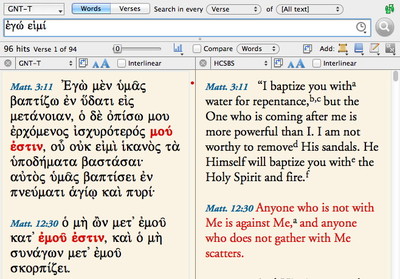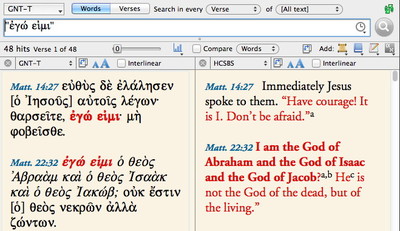How often do you hold down the option key when using Accordance? Holding down this simple modifier key can open up a host of powerful features you may not have known were available to you. On Monday we showed how you can option-click the close icon of any pane, tab, or zone to close all the other panes, tabs, or zones. On Tuesday I showed how you can option-click any verse to “bookmark” it. Today I want to show how you can option-click to search for Greek or Hebrew inflected forms.
First, let’s review the difference between inflected forms and lexical forms. A “lexical form” is simply the form of a word typically found in a lexicon or dictionary. When I look up the English word “ran” in a dictionary, if I find an entry at all, it will do little more than point me to the entry for the word “run.” Under that “lexical form” of the word, I will find a list of other forms of the word, such as “runs,” “running,” “ran,” etc. Thus, the lexical form of a word is that form which is typically used in a dictionary to represent every form of that word, and each variation of that word’s form is known as an inflection, or “inflected form.”
In Accordance, when you’re looking at a grammatically-tagged Greek or Hebrew text, the words you see are “inflected forms.” That is, each word has been inflected to indicate things like tense, voice, mood, gender, number, case, etc. If I am writing in English, and I want to indicate that the action of running occurred some time in the past, I will use the inflected form “ran.” In the same way, Greek and Hebrew writers chose the appropriate “inflected forms” to communicate what they intended. Once again, when you look at the words in the text, you are looking at specific “inflected forms.” In fact, one of the challenges of learning an ancient language is being able to identify the “lexical form” a particular “inflected form” comes from—so that you can know what the word actually means.
In a grammatically-tagged Greek or Hebrew text, scholars have actually “tagged” each word in the text with its corresponding “lexical form” and parsing information to make life easier for those of us who haven’t completely mastered the languages. (Can I get an “Amen!”?) This also enables you to find every instance of any “lexical form” no matter how it has been inflected. In fact, when you search for a word in one of these texts, Accordance assumes that you want to search for the lexical form rather than a particular inflected form. Nine times out of ten, a lexical search is more helpful than an inflected search, but there are times when you want to search for a particular inflection.
For example, let’s say you’re reading John 6:35 in the Greek New Testament and you see the phrase ἐγώ εἰμι. You want to search for all instances of this phrase, so you select it and click the Search button on the Resource palette. (Depending on your settings, this may bring up a menu, in which case you would also select the Search item from the menu.) A new Search tab will open with ἐγώ εἰμι entered in the search field. However, because Accordance defaults to searching for lexical forms, this search is actually looking for any form of the word ἐγώ followed by any form of the word εἰμι. Consequently, the first result it finds is the phrase μού ἐστιν rather than ἐγώ εἰμι.
Is there an easy way to search for inflected forms rather than lexical forms? Of course! Simply hold down the option key when you click the Search button on the Resource palette, and Accordance will open a new Search tab with “ἐγώ εἰμι” (note the quotation marks) entered in the search field. The quotation marks tell Accordance to search for specific inflected forms rather than lexical forms, so that you find only the phrase ἐγώ εἰμι.
You can, of course, enter the quotation marks manually any time you want to do an inflected search, but when you select text and use the Search button on the Resource palette, holding down the option key will automatically set up an inflected search for you.



